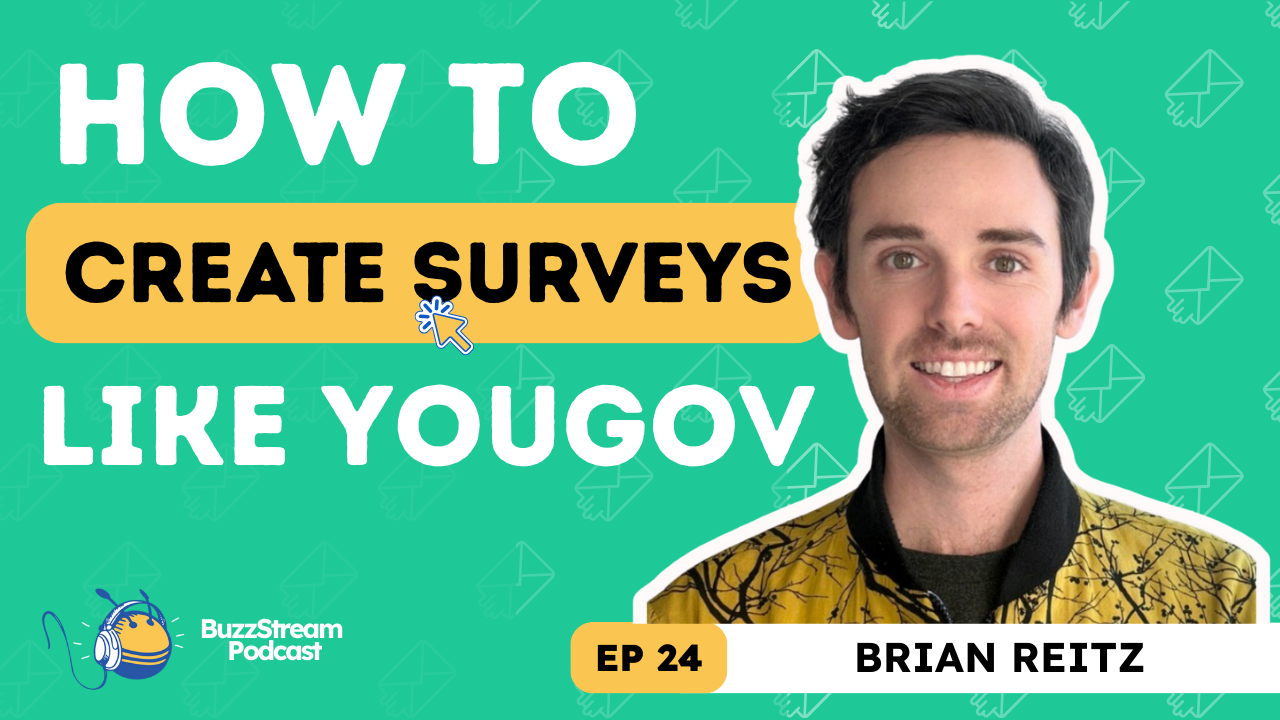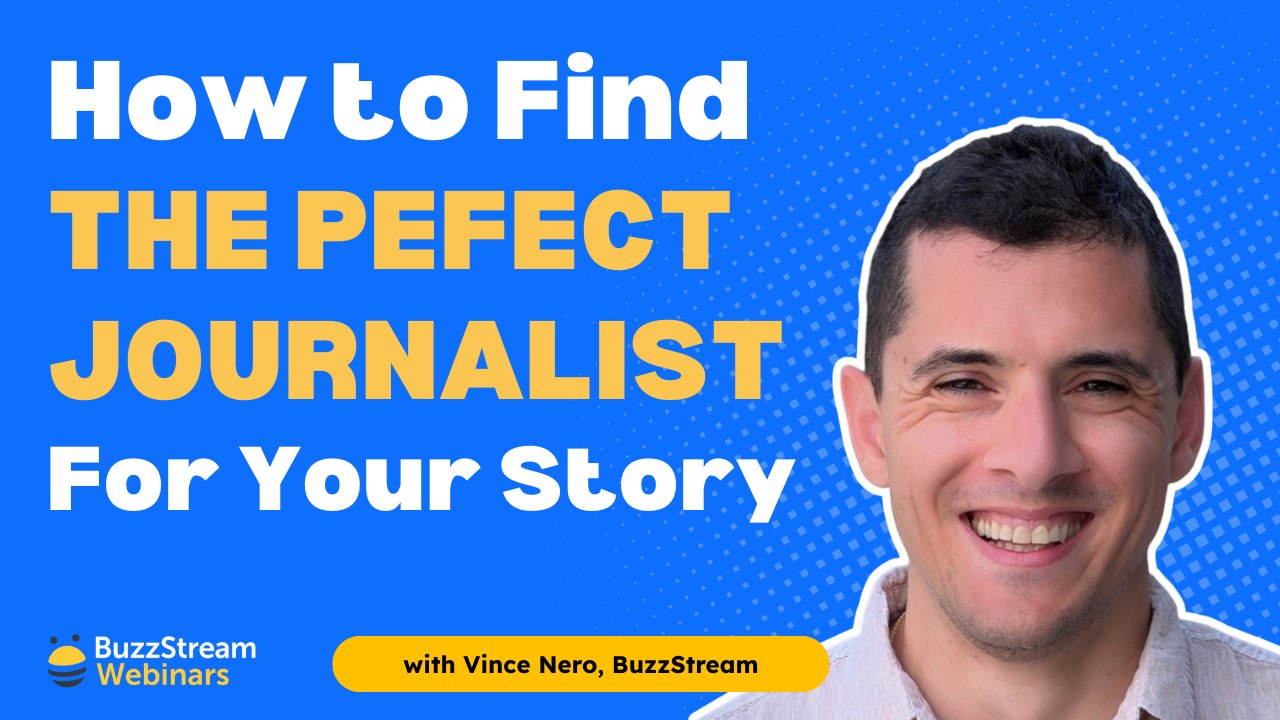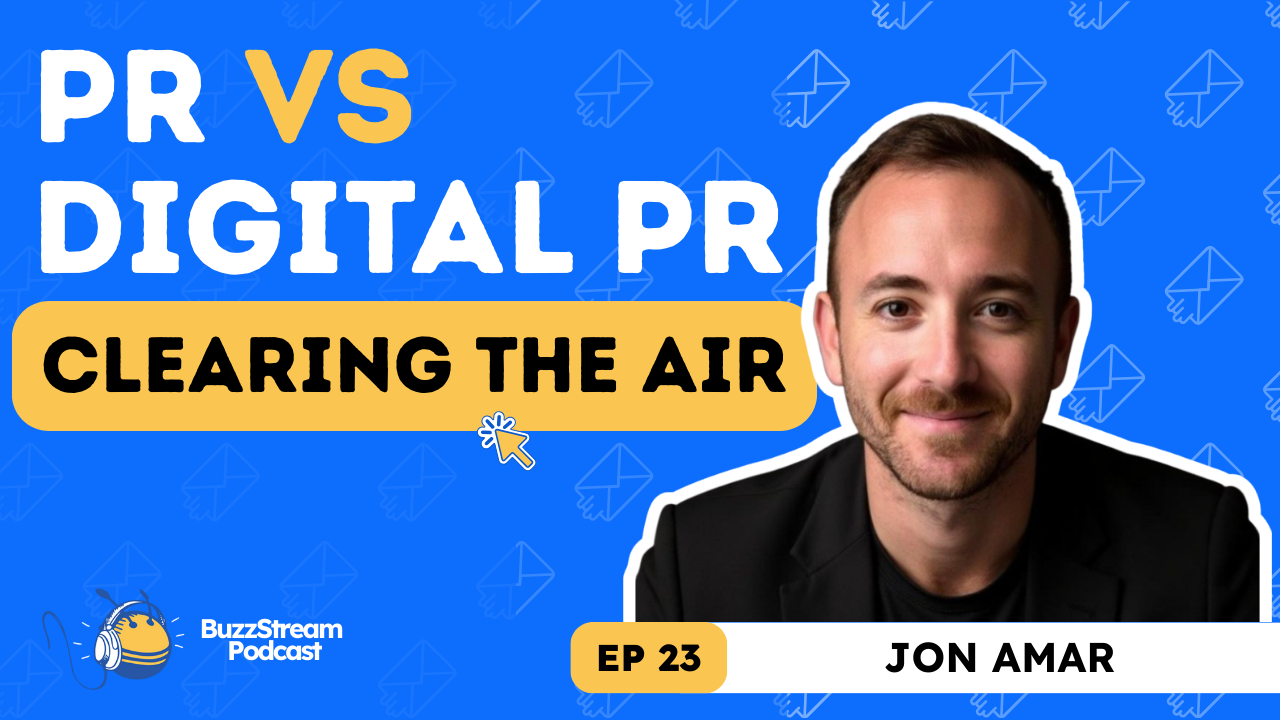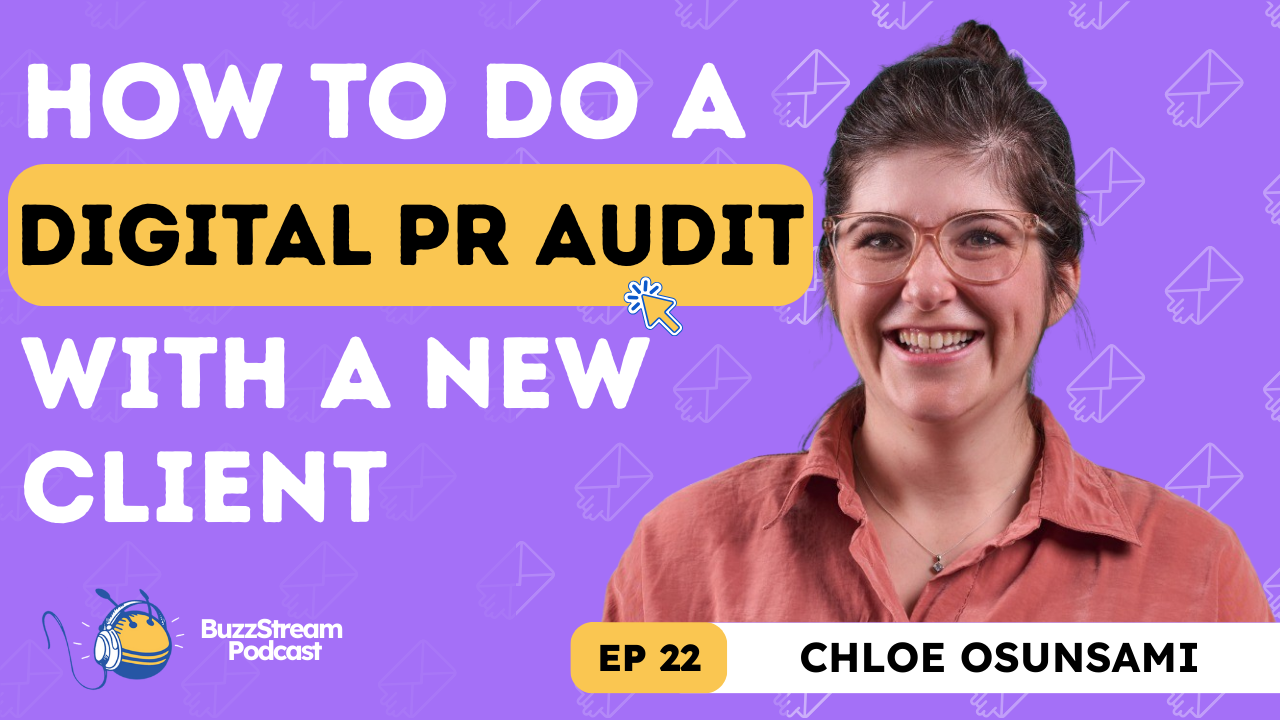Table of Contents
This was a very special podcast for me.
I first came across Brian Dean via his Backlinko site around 2014. I ended up taking his course, SEO That Works, and I credit what I learned in that course with helping me get my first real content marketing job with Siege Media.
Since then, I’ve been an avid reader of Brian’s work, consistently inspired by his writing, SEO, video tips, and Exploding Topics.
Interviewing Brian about link building and SEO was an amazing full-circle experience.
We got to talk about Exploding Topics, link building, data studies, and of course, the skyscraper technique.

Do you pay attention to algorithm updates?
Yeah, pretty much. I especially feel like more and more I’m nowadays spending less time on algorithm-related things.
Like, there’s like the helpful content update…there’s all these updates. I don’t really, you know, look at them. I don’t really pay attention to the winners and losers. I used to pour over that stuff.
There was an update and someone did a winners and losers analysis like I used to look at back in the day.
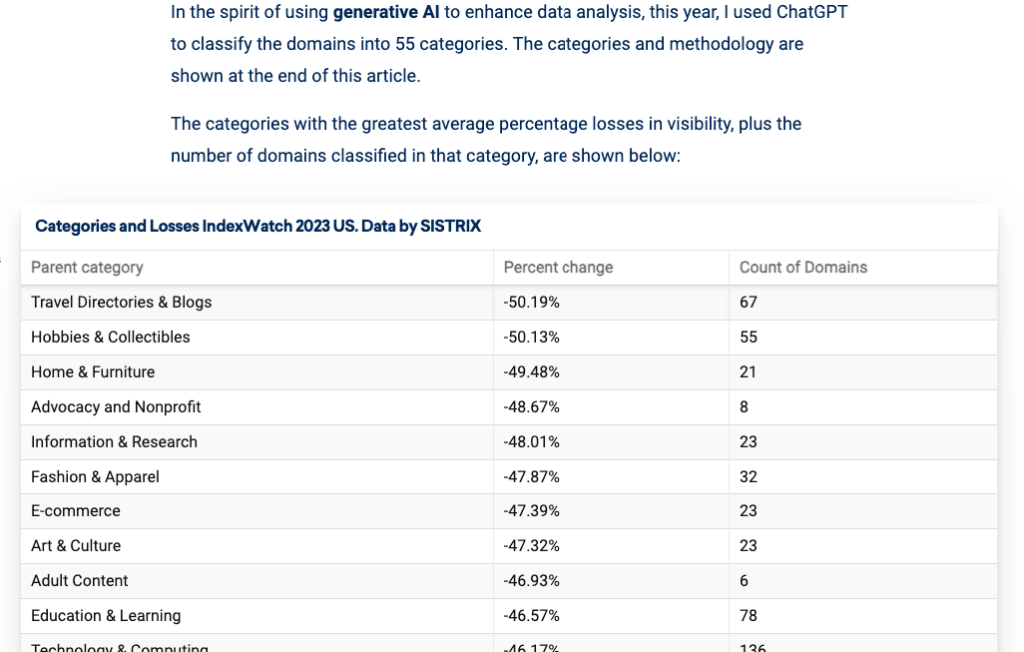
I would be like, oh, okay, trying to figure out the connection between this site that was good, this site that got hit.
And it’s kind of fruitless because even if you were able to see the algorithm, like say just Google is like, here you go, here’s all the ranking factors, here’s exactly how it works.
You’d probably do the same stuff because there is not like ranking factor 18 is some loophole that you can exploit, right?
It’s, you’d still have to do the same amount of work. Like they’re gonna say, okay, we’re really, authoritative trustworthy websites, we want brands. Like, so one of the ranking factors, let’s say in a way is like, you know, your brand, then you got to go build a brand.
That’s not easy. That’s really hard to do.
So whether and plus you should do it anyway, whether or not it’s a ranking factor. So for me, I don’t spend a ton of time on the news of like, what’s going on with Google.
And I feel like that’s yeah, my approach is basically create the best content for the user and build an authoritative brand and the rest will sort of take care of itself.
Is link building a ranking factor? Let’s start there.
Well, yeah. Links are an important ranking factor for sure. And I think Google, for many years, has wanted to get away from them because they are easy to spam.
They’re easy to game. You can buy them. You can manipulate your rank. You can build a private blog network.
There’s a million things you can do to game that signal.
But, they haven’t been able to find anything that’s better. Because when you’re, if you’re able, what I think they realized is, if you’re able to filter out the junk from that, then it’s an awesome ranking factor.
And before link building was a thing, like in the golden days of Google, it was the best ranking factor because no one was even gaming it.
For example, when Google first started, the link graph was just natural.
It’s mostly natural now, I think, to be honest, but it was 100% natural because no one was really trying to game the system.
So that was 30 years ago, almost.
So they really have always tried to get away from that as a signal because of all the reasons that we mentioned.
It’s not just like the number of links.
There’s so many ways you can slice and dice the value of a link from page, old school Page Rank to the relevancy of the site linking to you, the relevance of the page linking to you, the anchor text content around the link, link velocity where the links are on your supporting to your site, are they all to one page, certain subset of pages, the entire site like this is just like a couple things on top of my head.
There’s hundreds of ways you can slice and dice that one ranking factor and get value out of it.
Versus like social media, which is just like an S*** show where with signals and posts and likes and comments and you don’t know what that means. How do you interpret that stuff?
So, I really strongly believe Google still uses links as a ranking factor and I don’t see them getting away from it anytime soon.
Do you do much link building these days?
Not really. I mean, we do link building in the sense where we publish content designed to, not designed to get links, but we publish content that will hopefully generate, you know, people will link to us.
But don’t do any like link building per se.
I know that’s something you’ve long preached is creating great content that will kind of naturally get you links.
Where do you stand on buying links?
Yeah, I mean, I always discourage people from buying links. I’ve never been a fan of that. I’ve never really done it. Except back in the day during the pre-Penguin like…you know, wacky days where everyone’s buying links.
But since then I never really bought links.
And the reason was two-fold:
One is that you can get caught and people do get caught with manual penalties all the time for doing it.
Also, if you can just buy a link from a site, then anyone can. So those domains tend to get degraded over time if they aren’t already.
So what happens is a lot of times they’re like, no gambling, crypto, CBD, blah, to make it seem kind of legit. And then they eventually allow like a borderline one and then it’s a free for all.
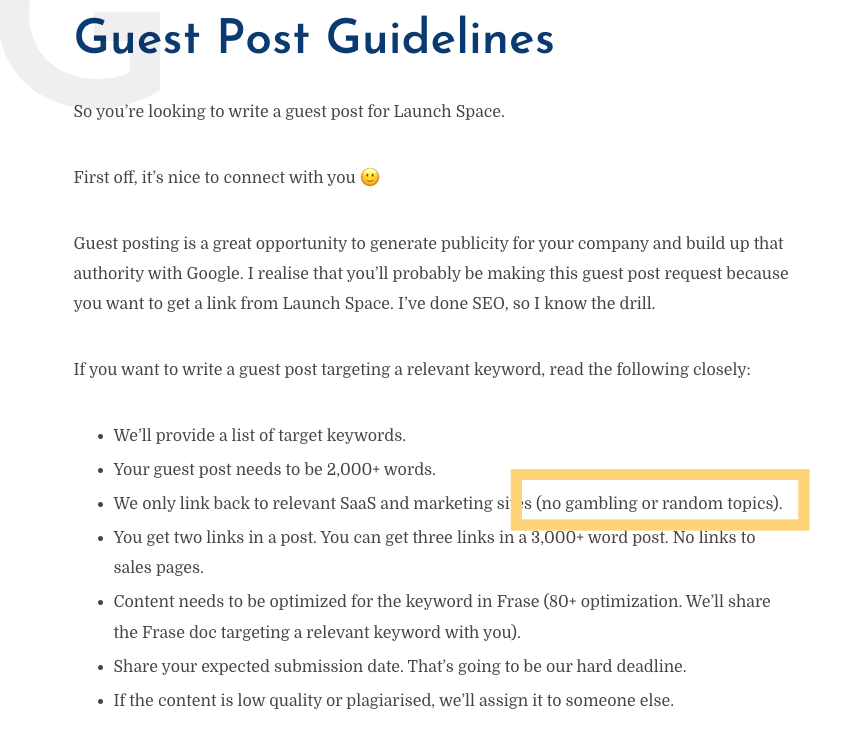
And then your link is all of a sudden goes from like, Oh, this is really nice link to like on a spammy site with bad neighborhoods as I used to call it.
So I, so for those reasons, I never really, I thought the upside wasn’t really worth it.
It’s kind of like, um, making money. It’s easier to rob someone that’s walking down the street than it is to like build a business or work hard. So it doesn’t, this gets easier doesn’t mean it’s better.
How do you get links if you are just starting without buying?
With Exploring Topics when we first launched, we got tons of links before we even had a blog because people were linking to our tool because it was useful in that way. That’s just one of many examples.
You can also do a PR campaign. You can have a story.
One of the things we did in the early days for Exploring Topics, to give you ideas of things we did and we had no authority, was my co-founder Josh.
I actually bought the original version of Exploring Topics from him, which was an acquisition, you know, a small scale acquisition, but still an acquisition.
So for him, he went on all these Indie Hacker podcasts and websites like IndieHackers.com. He was on Andrew Warner’s show. He was on the Product Hunt podcast.
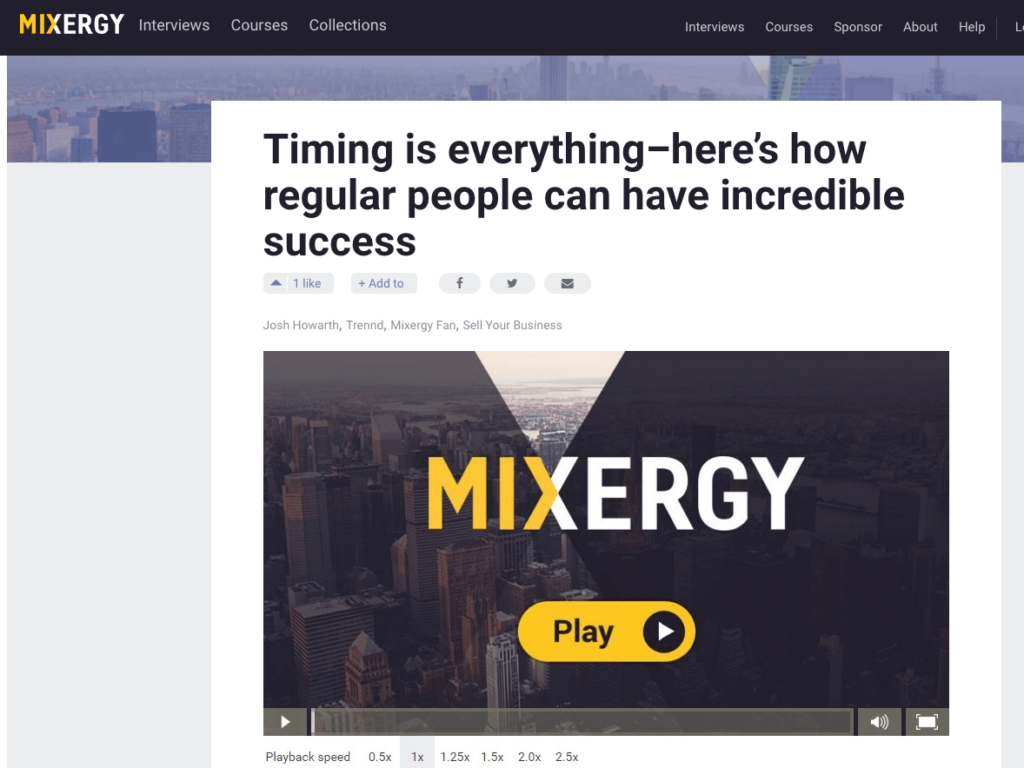
And he had no one knew who this guy was, but he pitched them and said, hey, “My name’s Josh, I built this thing. It got acquired like, I don’t know, four months later. And I’m here to tell my story of how I did it.”
So he was able to get links, not buying them, not paying for them, not guest posting, being creative.
And I think there’s still a world of opportunity there if you don’t have any authority yet.
Is digital PR valuable for new sites?
Oh yeah, for sure. And that, if you can do that on day one, then why would you ever buy a link?
Because you can get tons of coverage without needing any authority.
Because if you have something interesting, especially data or a story or both, then you can get coverage and they’re not gonna be like, wait, your domain authority flat, like they don’t care. A news outlet doesn’t care. So they’ll link to you.
So I’ve…done PR and I’ve had success with it, but it’s not like I’m like some ninja where on day one can do a launch. But if I could, I would do that because it’s faster.
But yeah, if you don’t have any experience with PR and you want to try it, do it and then you’ll that’s the best way obviously to get experience.
What are some other ways to build links just starting out?
Building some tool is really helpful or telling a story of how you achieve something with your company or in your life because there are podcasts that they need guests.
Like a lot of these podcasts are weekly and they don’t just want to have and recycle the same guests either.
Tip: (Interested in joining the BuzzStream podcast? Reach out to vince [at] buzzstream.com)
So if you can come in and say, Hey, you’ve never heard of me, but I got a story to tell and I know your listeners are going to find value in this. And that’s a tactic you can use to just get those first couple of links. And usually from there, the world is your oyster.
Is the skyscraper technique still a relevant link building technique?
I would say kind of, not the way it was originally written in 2013, 11 years ago.
Gary V said, “marketers ruin everything.”
So that is no exception. Uh, so yeah, it’s, if you were, if you’re like, I have this brand new website, I’m looking at the top 10 for this keyword. I’m going to create the ultimate guide. I’m going to email people and hope they link to me. You’re going to be in for a world of pain.
That did work. Doesn’t anymore.
So that’s actually why I wrote on the back link, go blog, this skyscraper technique 2.0 post, which was kind of a more refined version of the original, which was really focused on search intent and finding out what people want.
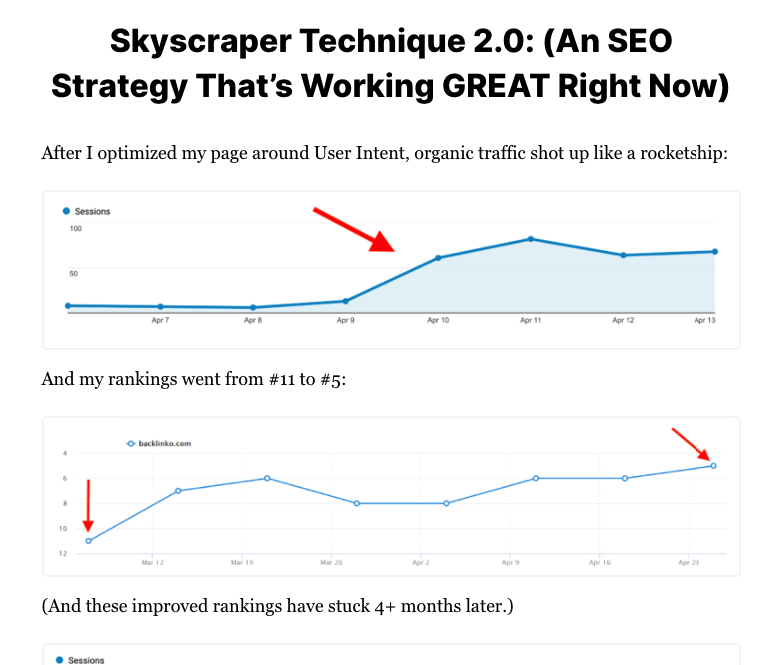
And sometimes they, searchers want an ultimate guide.
Sometimes searchers don’t want ultimate guide. They want something shorter.
Sometimes they want a list post. Sometimes they want whatever.
And the better you can match that, the better you’re gonna perform rather than trying to create some mega guide, 8,000 word monster just for the sake of doing it.
So, it’s a little bit more nuanced because much easier to say, okay, you know, everything is 2000 words. I’m going to create 4,000. Like everyone can kind of understand that and implement it.
It’s harder to be like, okay, I’m looking at the top 10 for business trends. Um, you know, there’s McKinsey, Deloitte. How can we create something that’s similar to these?
It has like a lot of the same beats, all the same structure, but is objectively better without just making it twice the size.
And that requires like a kind of like x-ray into the searcher’s mind.
And anyway, if you want to learn more about that, I have a whole post in the back link, a blog called skyscraper technique 2.0.
You can read about that, but yeah, the OG version, I mean, it’s. It still has value in that sense.
Like that’s a good way, I think still to approach content rather than starting from scratch. If you have a topic rather than just being like, Hmm, how should I write this? Should it be a list? Should it be blah, blah.
Just look at what’s already ranking that gives you at least a clue of what searchers want and then going with the flow.
What are your tips for people who want to create data studies as a link building tactic?
The first thing would be you should have a budget for this. It’s very expensive to run these studies. Even the simplest ones are pricey.
Because to do them right, you need to have a data analyst do it.
Like you can’t, unless you have that experience yourself, you need a Python coder, and then you need to actually run the data, find it.
So you hire someone to actually do the analysis, and then you need to put all the data together into charts and graphs and visuals, and then write it up and then promote it.
So it’s sort of a huge process.
In fact, I created an entire course around this called back in the day called get press every month, which was a way to just scale these up.
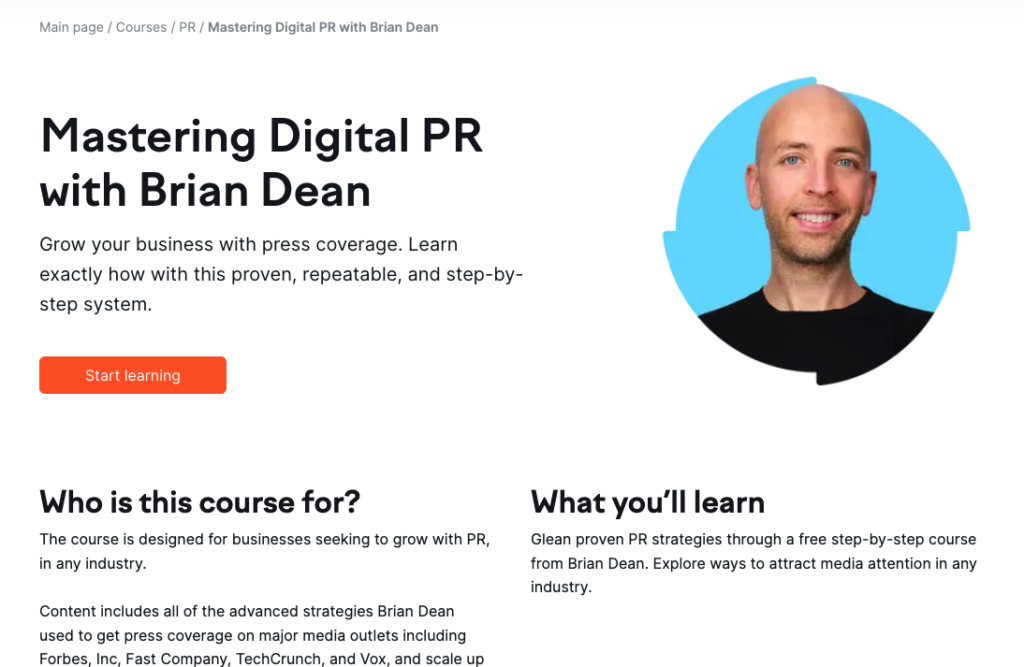
Cause I did figure out how to scale them and you can find a version of that on this in the semrush Academy.
So when they bought Backlinko, they took that course and modified it and put it on there for free so you can check it out now if you want to, if you want to learn more about it, but yeah, my number one piece of advice to be like, this is not a cheap tactic.
It’s expensive. Even the cheapest one I ever did I think was a B2B blog analysis.
So what we did was, we looked at B2B blogs, and I forgot how many, a couple hundred. And I literally had someone manually look to see, you know, like the average post length, whether they allowed comments, whether they had social sharing links.
And the idea of this wasn’t to correlate anything. It was just to see like the state of B2B blogs and see how many had like a pop-up, how many had a lead gen form, things like that.
And that was the simplest thing you could possibly do. And that was still like a couple of thousand.
So, you know, and some of mine have costs like, you know, $15,000, $20,000 to do.
So they could be really expensive if you’re running massive data.
So now some of these were our own, we had to set up our own stuff in it, doing millions of results.
The other thing was, would be to find a partner if you can. So that’s something I learned later on. I was kind of like, why am I, we building custom scrapers to go out to the world to do this stuff when you could just email like Buzzsumo in one of our cases and just be like, “you have this data sitting around. Do you mind just like partnering up with us?”
Or Pitchbox was another one that we teamed up with. “You have all this data, like on your open rates. If you could just make it anonymous and correlate it together into big chunky data and send it over”
That was a game changer because it made everything easier.
A little harder if you’re first starting out because then you’re gonna cold email, like BuzzStream for example and say, “hey Vince, what’s your average open rate?”
Okay, so then it’s probably not gonna wanna partner with you. But, if you have some authority and you wanna do these like a little bit more streamlined then having a data partner can definitely help. Y
How would you go about choosing a co-marketing partner for a data study?
There’s two ways that we did it. One was beginning with a study in mind. So say we wanted to get an idea of one of the most successful we did was with Buzzsumo, which was, content marketing, like success factors basically.
So, you know, what correlated with content getting more social shares and more links, that’s basically what we looked at. And it was like, who has the best data on this?
Well, BuzzSumo, right?
Because they have an index of like millions and millions of pieces of content and they track links and social shares in every single one.
For some others, I had relationships with the tool, either the co-founder or someone there. And I would think, hmm, if we could partner, what would they provide that would be helpful to do a study?
And what’s in it for them, if you’re asking, is exposure from a totally different audience.
So a lot of software tools are good at software, but not so good at marketing.
So if you could say, “Hey, I can send you like hundreds of visitors and all this stuff.”
It’s like a PR campaign for them, but they don’t have to do the PR. They just have to provide you some data, which for them is easy.
The part that’s hard for you is easy for them and vice versa. Right?
The hard part for them a lot of times is getting the word out and for you that’s easy.
So it’s definitely a fair trade and something that you’d be surprised how receptive brands are to doing.
What happens if your data (or other studies) refute a common practice/belief in the industy?
It’s a good question. It’s a tough one to answer because I did so many studies.
I’ve experienced on both sides where I produced them and gotten absolutely crucified for certain things and read some that I thought were brilliant read some that I thought were complete crap.
So to answer your question, I wouldn’t read a study and just be like, okay, guys, gather around. Here’s what we’re gonna do from now on. That’s stupid.
But you also shouldn’t just dismiss results because it doesn’t fit with the narrative that you think is true.
A good example is one of the biggest studies that we did that was super controversial was that we found no correlation between site speed and rankings, which at the time was like blasphemous because everything was Core Web Vitals like Cumulative Layout Shift and stuff.
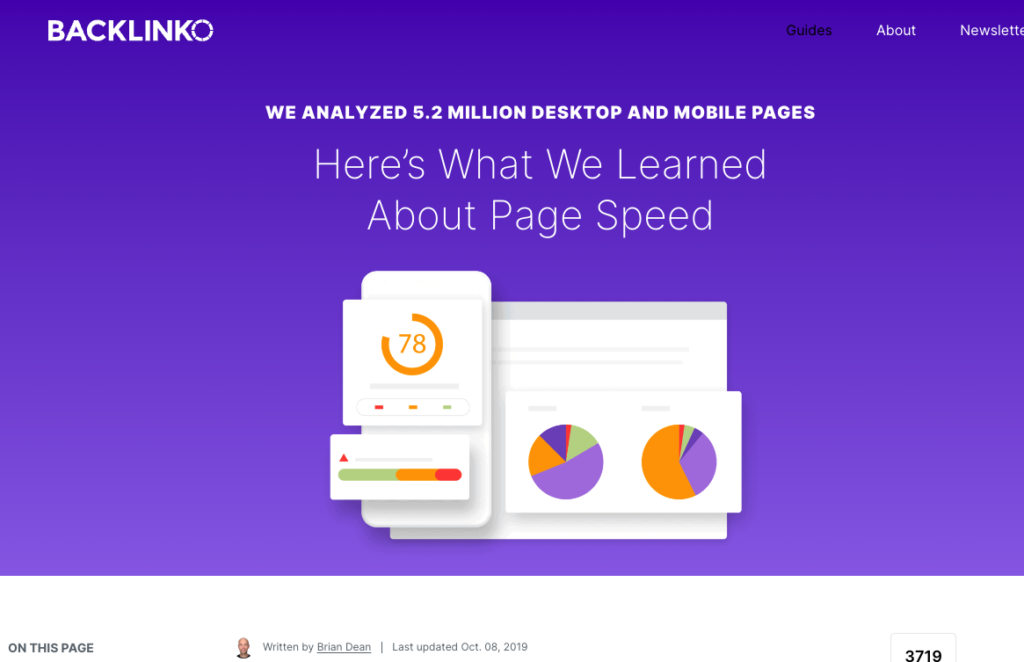
I mean, people were obsessing over these metrics.
And we found they basically didn’t really like, we didn’t look at those core web files specifically, we’re just in general, sites, we didn’t correlate with rankings of people like this is like crazy.
This is like, some people said it was dangerous to share this stuff.
And come to find out, it’s not really an important ranking factor.
And Google has even said since then, it’s not an important ranking factor and actually going to to get rid of Core Web Vitals.
So there really weren’t, and then I did another study which was a case study, because people were like, well, you only looked at this, because we only looked at the site in general, not this specific page, which was due to the limitations of millions of data points.
It was easier to look at the site’s loading speed.
But I didn’t think that was a huge deal because usually, a site loads pretty consistently across the site. It’s not like one page is super slow, and one is fast.
And then I did a case study where I took a post from Backlinko that was loading really slowly because it had these big images and it wasn’t really optimized and I had a developer go in and just like clean up the code— like do basically take it from a WordPress page to like an old school HTML page—so it loaded super fast.
I forgot exactly the difference in loading speed, but it was dramatic. And rankings were exactly the same.
So people freaked out on that because then they said, “Well, that’s only one example. There’s not enough data there. It’s only one case study.” Which is true, but for me, that has more value than a statement from Google because it’s actually showing like it’s an experiment.
It’s not perfect, but it’s at least an experiment.
And again, this isn’t to draw conclusions from it.
And even with my original study that found site speed wasn’t a ranking factor. It’s not like, oh, you should make your site load slowly on purpose.
But it’s showing that maybe it’s not the big deal that people are making it out to be. And it turned out to be right. It was just a lagging, there’s a lagging indicator because Google took so long to come out and basically confirm that it’s not really an important ranking signal.
And then, but if you just looked at the SERPs at the time, and even now, there wasn’t a big correlation between it.
There were sites that were super slow that loaded, that ranked well, and there were sites that were fast that didn’t rank.
Like it was one of those things that had no correlation.
So anyway, my point is that, especially nowadays, I definitely wouldn’t even pay too much attention to these studies because it’s stuff you should be, like at the end of the day, what are you gonna do differently?
You know you need to build links, you know you need to create your content, you know you need to have a fast learning website, not necessarily due to SEO, just in general.
Is it important to take big swings with your data studies (even if you miss?)
Yeah, I think you should always, if you feel like you’re proud of it, you should publish it and how people react, you can’t control that.
But it wasn’t, I was never like trying to be a provocateur that published stuff and was like, come at me, I was never like that, I’m just not like that.
But I also was never letting the mob run my business and say, okay, well, we have this study, it’s really interesting, but man, people are gonna be upset about this finding because it’s just data.
And if you don’t like it, I don’t know what to tell you. And that’s really what it came down to with a lot of the studies.
The other thing that was good about taking the swings is that I was consistently wrong about what studies would do well and which ones would do poorly. It was always almost the opposite of what I thought.
So by putting them out there and just…trying, you never know what’s going to happen.
Like we would work so hard on some of them and they would fall flat and they would put out one that was like, yeah, it’s all right and then it would do really well.
So the important thing is just to like, if you can scale this process, try to do every month.
That’s why I had that course was called Get Press Every Month, because if you have a dialed in process with collecting data, ideas, a good writer, and finding data partners, you can easily do one of these every month.
These studies were by far the best content perform like by performance in terms of any metric you want to look at traffic, shares, links. It was always a study.
More than the skyscraper technique or any case studies, it was always that.
And a good example of like anyone can do it and you don’t necessarily need a huge budget is when voice search was starting to take off.
We did the first voice search ranking factor study.
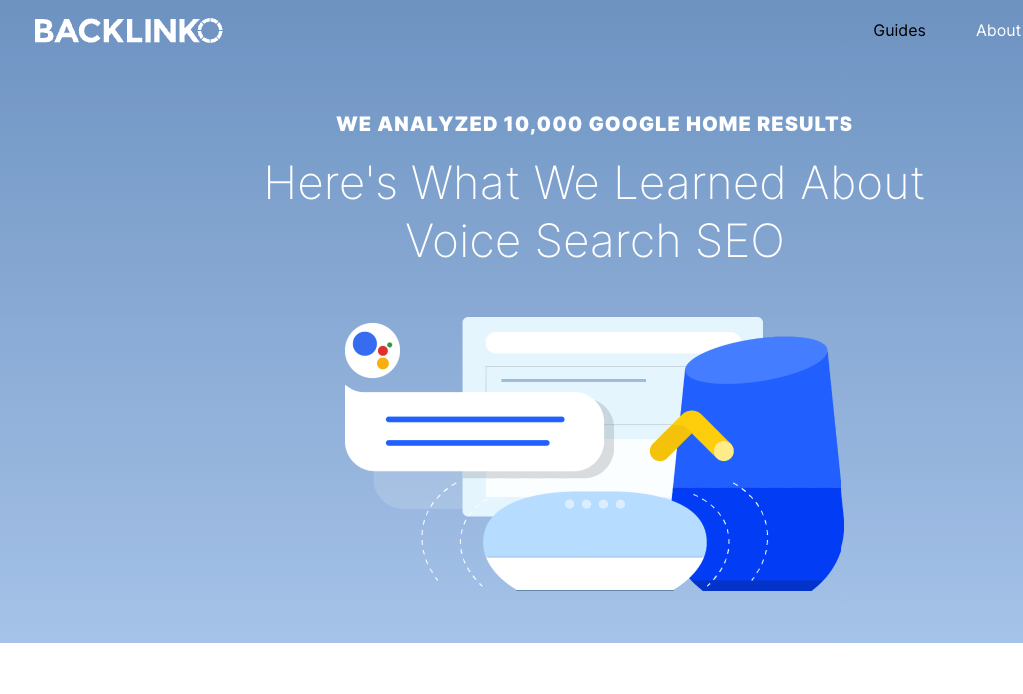
And to do that, we literally had someone from the team get a Google home and just literally ask it questions and record the results, um, and then go back and see where they got those answers from.
And it wasn’t always the number one result in Google. And why? And we looked at different factors that correlate, like site speed or whatever.
And it was interesting.
It was something that anyone could do.
And again, that was a perfect example of like, don’t necessarily see this study and start changing your content because of it.
But it can at least start the conversation and be thought provoking about how does this even work? Because if you wait for Google to come out and hand you the algorithm in a scroll, it’s not gonna happen.
So you gotta do some like experimenting and see what happens. And that was one that did really well, partially because it was also like a new trending topic, which helped a lot.
And it was the first of its kind.
But it was also like, anyone could have done that. When I did it, I was actually worried someone was gonna do it first.
And I kind of underestimated how lazy people are with content they’ll never do. They’re never gonna ask Google Home a thousand questions, record the answers, and analyze the results.
So you don’t have to worry.
If you’re willing to put in that little elbow grease, you’d be surprised what you can accomplish with this sort of stuff.
How and why is it so important for digital PRs and link builders to take advantage of trending topics?
The number one reason is that everything will work better that you’re doing if the thing is trending. If you did the same exact campaign, the same email, the same people and created the same content, but it’s six months later, a lot of times it won’t perform nearly as well. The timing is key for this sort of thing.
And if you can get at the right time where journalists are paying attention to the space, they’re already writing about the space, and you can insert yourself into an existing conversation, then it’s so much easier.
Everything just works better. It’s a force multiplier.
So that’s the main reason.
It’s not to say everything you do needs to be on a trend. That’s not the case. Like a lot of our studies were just things that weren’t even necessarily on this trending up at the moment.
But the best-performing studies generally were on some sort of trend.
Imagine you’re a writer for Forbes, like an actual writer (not a contributing author) like a legit reporter, and you’re writing about AI or covering Chat GPT and all these different AI tools. Then someone emails you and says “hey, we just did a like a study on LLMs and we figured out which ones have the most tokens (just totally random example.)
And we ranked all the tokens of all of them. And this is proprietary data. Like no one’s really done this.
You’re much more likely to get coverage doing that than just being like, hey, “I have some study on which of the smartphones have the best cameras,” or , “which smartphones hold the germs the most germs”.
You’re going to get that person’s already writing about this stuff.
So, if you can get on that trend, everything works better.
It’s not to say they won’t cover the smartphone thing, but they’re much, much more likely to cover anything related to AI if they’re right about tech.
And that’s the same if you’re in the beauty space. If you get in front of journalists who cover the world of beauty and you say, okay, “I have data on like 10 beauty products that are taking off right now,” you’re much more likely to get coverage doing that than saying like, we did an analysis of 100 beauty products to see which ones are the most natural or which ones contain toxic ingredients.
I mean, that’s still an interesting study, but it’s not necessarily on a trend.
So, basically, the story is journalists are obsessed with trends; they love writing about trends.
And if you can just ride the trend, it’s so much easier than trying to push a boulder up a hill.
Can Exploding Topics uncover topics in a quick enough way for digital PRs?
Oh yes, absolutely.
I mean, we have tons of digital PR customers.
What sets us a little bit apart from Google Trends in general is that we’re more focused on longer term trends, not fads.
Both are actually helpful to know if you’re in digital PR.
So, if you want to know what’s happening like today, this exact moment then Google Trends or X is really good for that.
But if you wanna know like trending, things that are trending now that are a little bit under the radar, but are really gonna take off in six months, then that’s really what our specialty is.
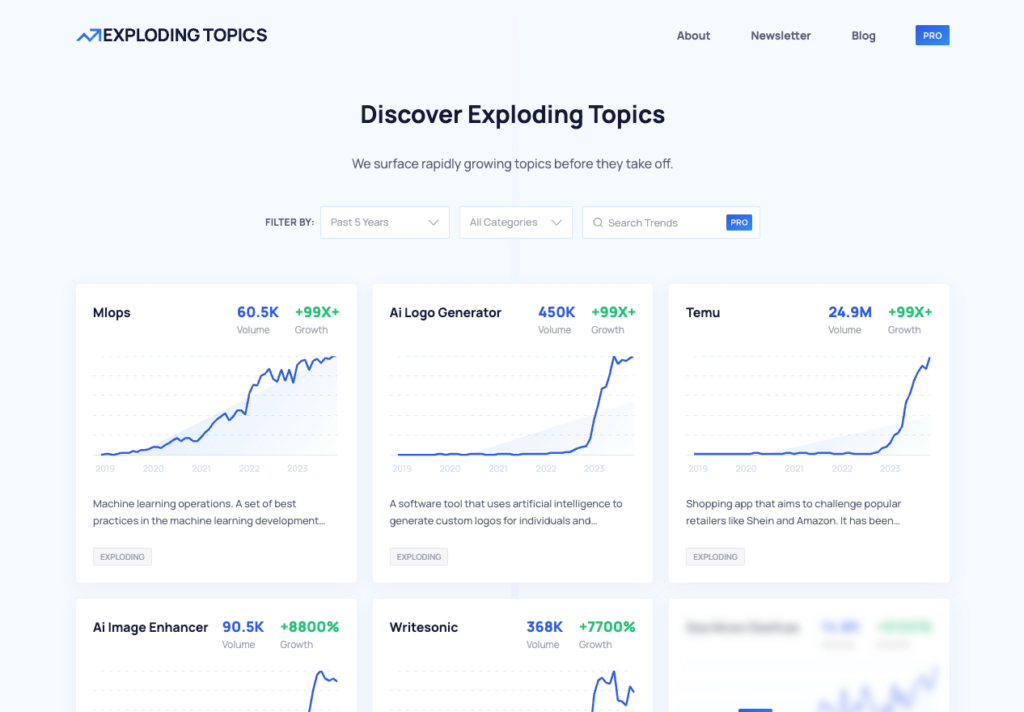
So they’re kind of different ways of looking at trends.
Like I always say Google Trends should be Google Fads because it’s really just like the news of the day. It’s like some celebrity thing, some political thing, right? That’s not really a trend.
By the time you would create a study on that or something, it would be old news.
But, an actual trend like generative AI—that’s a trend that’s likely not gonna go away in six months. It’s probably only gonna be bigger.
So that’s really what differentiates us.
So that way, if you are on digital PR, you can feel confident that if you just discover a trend today, you can create multiple campaigns around it before it sort of starts to dip down.
How do you recommend digital PRs pitch to stakeholders for trends that don’t have search volume yet?
Well, yeah, I mean, the number one thing I would do is rather than trying to say like, this will be the next big thing— which is very difficult to prove— is show other metrics of the topic being popular.
Right? So if something shows up in a tool with zero search volume, then it doesn’t, as you know, it doesn’t necessarily mean that it’s zero search volume.
So, you can say that to the stakeholder, but they’re going to be like, OK, but it still shows zero there.
But if you can show that this many posts on the videos on TikTok, or even one video on TikTok, has a million views about this topic, then all of a sudden you have some data to back you up.
And especially if you show that discovery process.
I discover something on social media and then I Google it to learn more. Then you’ll say, well, this is really strong indicator because on TikTok it’s already kind of a thing.
So pretty soon, people are going to be searching for it in Google with enough numbers, in enough quantity, where these tools will start to pick it up.
So, I would just go in and say, look, zero search volume doesn’t mean zero search volume. It could be huge.
Usually there’s something you can rely on data wise to show them that this is actually a thing.
Now, the real opportunity is that it’s going to be likely even bigger in the future.
Where can traditional link builders get value out of Exploding Topics?
If you’re doing resource pages sort of thing, not really. It’s a little overkill for that job function.
What about passive link building?
For that approach, it’s really helpful. It’s actually necessary really, because if you want to do that, use this the strategy of creating content that is designed to get links.
If you are late to the party, it’s going to be hard to get into that flywheel because someone else is already in it, right?
Or multiple other sites are already in it.
So you, a first, that is where like weeks can make the difference between that succeeding or failing.
So for sure, we use it internally all the time. Some of our best content when it comes to this sort of passive link building or trending or related to trends.
To give you an example, we know we found Clubhouse early on (remember that social network?) And on Backlinko, I wrote a big piece, which was like Clubhouse User Stats, like how many users they had, how fast it grew, anything that we could find on it.

And like the next day, I got a link from the Guardian.
Didn’t do any email or just boom, like that.
And that got a lot of links actually over the course until a Clubhouse obviously declined.
But, for a while it got a lot of links. And the only reason was that we were first.
If I published that same thing like a month later, that Guardian piece would have cited somebody else and then that somebody else would have ranked and been in the flywheel and I would have been in the outside looking at.
So that’s super important to be on top of these trends.
Why is it important to catch a trend before it peaks?
Especially when it comes to that passive link building, because the trend is also the journalist searching for this stuff. And with something like Clubhouse, that didn’t last very long.
So that was one where it got a lot of links in the beginning and then it went to zero.
So it’s still a success, but ideally you’d be writing a topic for years, right? And it would still be trending.
If you kind of capitalize on a fad, you can get a couple links from this sort of like outreach, getting journalists to cover your thing.
But then it’s old news very soon versus if you publish, if you’re covering things that have long term traction, you can, journalists will be searching for data sources for years and find you and link to you over the long term.
And that’s where those real like 1% pieces come along that you publish it and it just kills and crushes over years.
Businessofapps.com is a good example of this. They published some early TikTok user stats and are getting like thousands of referring domains to it.
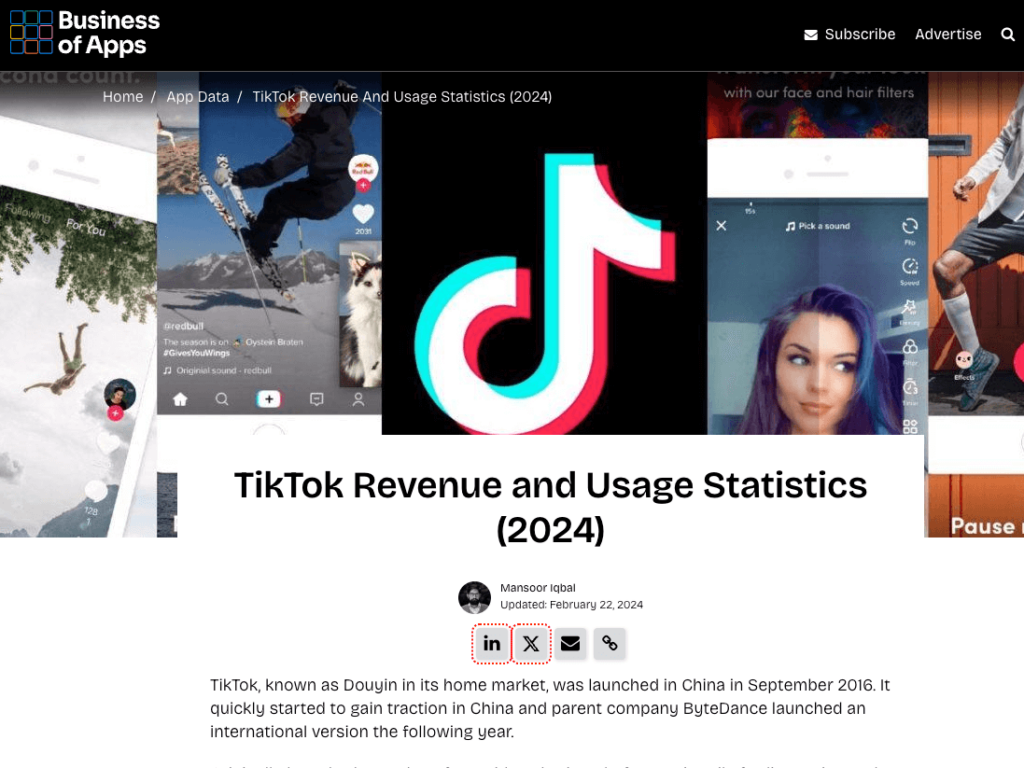
It’s well done, but I mean, it’s disproportionate for what it is. It’s literally just a collection of stats and has like 2,000 referring domains, something crazy like that.
So, and that’s because they get in on the trend early. They were the one of the first to do well with it. And then it’s still going.
Like TikTok’s still a huge thing. So they’re still getting links every single day to that piece.
How do you recommend people think about these trending topics and their own site’s relevancy?
Yeah, I think I think it can hurt you if you get too far from relevancy, honestly, like brand wise and SEO wise, because you’re building up authority in this unrelated topic.
Like remember back in the day, people did those scholarship links.
So that hurt a lot that probably hurt more sites and it helped in the end because sites got absolutely hammered for doing that eventually.
And that’s because they didn’t care where they were getting links from; like the Toronto School of Auto Repair, or getting a link to a restaurant, like they didn’t care.
So for me, I always try to air—like a Clubhouse is kind of probably the most I would stretch now in terms of relevancy.
It’s not directly related, but it’s indirectly related.
If you go one more degree outside of that, I think it’s not good.
So for example, Exploring Topics, we published a few months ago, a stats page on texting and driving, and all the dangers of texting and driving and like, all that stuff.
And then eventually I was like, you know what, this doesn’t make sense. This is stupid. So, we deleted the page.
And it was one of those things where you could like wrap your mind in a pretzel and say, well, it’s texting, which is technology and we cover technology and you know what, you could do that like craziness.
You could justify anything is related to anything if you really try hard enough.
But common sense wise, I was like, this is this dumb to have on our site. So we just deleted it.
And I’ve done that for posts on Backlinko, I’ve done that for posts on Exploring Topics where you get all excited, you justify it, and then when you see it live, you’re like, this doesn’t look right.
It’s like, doesn’t feel right, so we deleted it.
So I would say definitely stick to relevancy, but the problem with relevancy is that, like you said, Vince, how do you measure it?
You can’t, there’s no objective measurement for how one topic is related to another.
It’s all up to your own judgment and discretion and how liberal you are with that.
So for me, I’m more as I do this longer, air towards the sides of things being very relevant. Because I think it just works better, it’s better for your brand, and I bet all the stuff works better for SEO if the content pieces you’re publishing are related to what you do.

 End-to-end outreach workflow
End-to-end outreach workflow



 Check out the BuzzStream Podcast
Check out the BuzzStream Podcast

